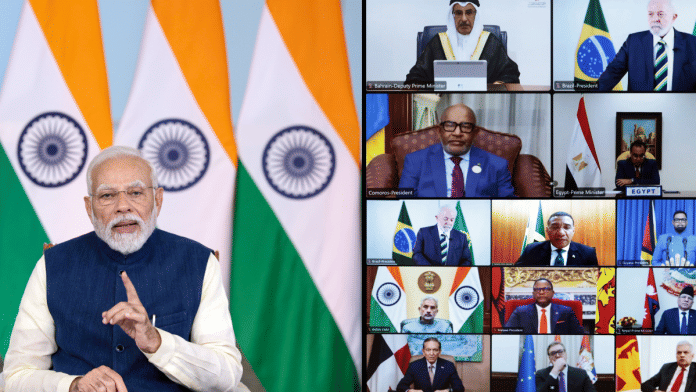New Delhi: The second Voice of Global South Summit (VOGSS), held virtually Friday, saw about 130 countries “strongly agreeing” that they must steer clear of situations where development initiatives and programmes lead to a debt trap.
Making a veiled reference to China and its Belt and Road Initiative (BRI), which many observe has caused debt traps in numerous countries, the summit called for more sustainable and viable development financing.
During a special media briefing, foreign secretary Vinay Kwatra said, “Debt burden came across strongly in multiple sessions, including the leaders’, finance, foreign ministers’ sessions. The thrust of most interventions was that we are facing strong headwinds of economic challenges due to global uncertainties.”
“Alongside these challenges, we have developmental priorities across various sectors. Financing for development projects within the Global South should not impose a debt burden on the structural parameters of the economy and be more sustainable,” he added.
Meanwhile, in his concluding remarks in the second leadership session, Prime Minister Narendra Modi asserted that the ‘Global South’ is ready for big responsibilities.
“The message from the Voice of Global South Summit is that the Global South wants its voice in global governance,” he said.
The summit, which had 10 sessions focusing on foreign policy, finance, trade, energy and more, witnessed emerging economies, such as Kenya, Nepal and Brazil, among others, agreeing on several decisions ranging from the ‘Global South’ shaping its future based on cooperation and reducing the East-West development dichotomy, among other things.
Some of the other takeaways include people-centric development finance, commitment to sustainable development and climate action, inclusive and sustainable energy transition, the need to prioritise investment flows within the ‘Global South’ and the need for reforming multilateralism, including financial institutions and the UN Security Council.
Further emphasising the emerging economies’ voice within the international sphere, member countries agreed on “the need for the Global South to speak more forcefully on global challenges and converge more extensively in searching for solutions, as these issues affect economic growth and development,” Kwatra said.
“The Global South should look for Global South answers to confront its challenges through cooperation, consultation and not confrontation” he added.
India hosted the first virtual VOGSS event earlier this year, on 12-13 January, where 125 countries participated in 10 sessions centred around education, foreign policy and more. The summit allowed these emerging economies to come together to highlight their issues on a global platform.
Also Read: Modi has exhumed Nehru’s Global South. Which fails the test of geography, geopolitics and economics
India’s G20 presidency, Israel-Hamas conflict and more
The countries at the summit also acknowledged the success of India’s G20 presidency as “one of their own”. The induction of the African Union (AU) in the G20 highlighted that “Global groupings can be persuaded to respond to the changing global realities and respond in a more inclusive manner,” said Kwatra.
External Affairs Minister S. Jaishankar said at the foreign ministers’ session Friday that “India walked the talk” when it came to the AU joining the intergovernmental forum.
Kwatra also asserted that “India and PM Modi mean what they say” including ensuring that the priorities and interest of the Global South were factored into the New Delhi Declaration.
On the Israel-Hamas conflict, the leaders emphasised three aspects — “terrorism”, “humanitarian crisis” and the loss of “civilian lives’”
“The leaders expressed strong concerns about the deteriorating security situation, which has very clear implications of all kinds in many of the countries,” said Kwatra, adding that a number of countries had condemned Hamas’s 7 October attack.
During the first leaders’ session, Modi “strongly condemned” both the Hamas attack and rising civilian casualties in his first public statement on the ongoing violence in the Middle East. He also said that the ‘Global South’ should speak in one voice on such critical issues.
Modi told the virtual summit: “We are all seeing the new challenges emerging from the events in the West Asia region. India has condemned the terrorist attack in Israel on 7 October. We urged for a restrained response along with dialogue and diplomacy. We also strongly condemn the deaths of civilians in the conflict between Israel and Hamas.”
Minister-level sessions on various topics
Eight minister-level sessions also took place during the summit on subjects, such as foreign policy with the theme “India & the Global South: Emerging Together for a Better Future”, finance focusing on “Financing People-Centric Development”, and commerce or trade ministers’ session on “Global South & Resilient Supply Chains”, among others.
Within the trade and commerce ministers’ session, Commerce and Industry Minister Piyush Goyal said, “The poly-crisis of the Covid-19 pandemic, impact of climate change and raging geopolitical tensions have disrupted and underscored the fragility of global supply chains”, while calling for more resilient and inclusive global value chains.
While calling for the strengthening of multilateral development banks, Secretary of the Department of Economic Affairs Ajay Seth, during the finance ministers’ session, said, “We cannot afford to let financing gaps translate into a sustainable development gap.”
“The G20 financial inclusion action plan for 2024 to 2026, also prioritises the deepening of engagement with the Global South. India stands ready to share its technical capabilities and knowledge resources for empowering the people of the Global South,” he added.
(Edited by Richa Mishra)
Also Read: After G20, India won’t get to be leader of Global South, can’t prevent new Cold War either






